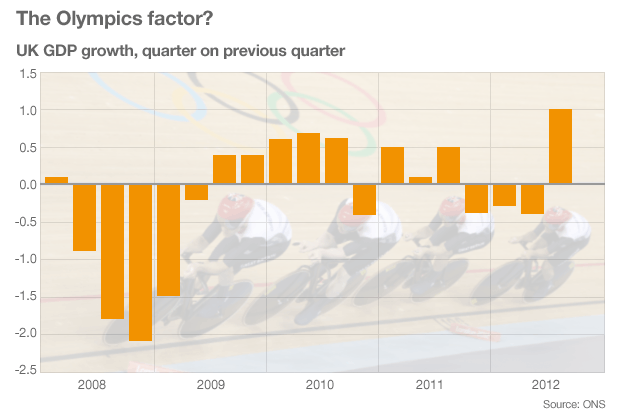GDP figures show Britain is out of recession - but there are both positives and negatives in the data
Our Chief Economics Commentator responds to this morning's news


So we are officially out of recession – and have come out with a much smarter bound than anyone predicted: 1 per cent in a quarter or an annual rate of 4 per cent. The GDP numbers are at last beginning to fit better with the other data on the economy, such as rising employment and record retail sales, and that must be encouraging.
Many economists believe that it was implausible that there was a second leg to the recession at a time of such rapid growth in jobs and these new figures give some support to that view. GDP data is almost invariably revised, sometimes several years after the event, so we should not expect this set to be the final word on the matter.
If you stand back and look at the UK economy as a whole, the broad picture that emerges is one of very slow growth, maybe 1 per cent a year. In any terms that is disappointing, way below its long-term underlying growth rate of 2-2.5 per cent, and particularly disappointing given the ground lost since the last peak. The economy are still officially more than 3 per cent smaller than it was in the first part of 2008. There is a long way to go.
Looking ahead there are both positive and negative signs. Among the positive are lower inflation, with the possibility that inflation might fall below nominal wage growth early next year. At the moment it is still a little above it. That would mean that real wages, the chief determinant of living standards, should start to rise again. We would, for the first time for about four years, start to feel a little richer. Consumers are already rather more confident than they have been for several years and, to take a snap-shot of the biggest consumer purchase, the UK is the only big car market in Europe, where sales are up rather than down.
That points to the chief negative sign: weakness of demand in the eurozone. Up to now the strong markets in Europe have remained just that, with Germany and Scandinavia reporting decent growth. The south has been weak, but we knew that. Now, the very latest outlook from Germany has dipped sharply, with German industry suddenly becoming more pessimistic about the future. That inevitably will spill over the the UK. Exports to Europe, already weak, seem set to weaken further. While some companies, notably Jaguar Land-Rover, have been able to rebalance sales towards China and India, it is unrealistic to imagine that we can suddenly replace exports to Europe with those to the emerging world.
So meanwhile the thing that will keep the economy moving forward will be domestic demand. These latest GDP numbers show particularly strong growth in our service industries and that is encouraging. But consumers remain strapped for cash. We are long way from moving the economy from its present slow walk to a brisk trot, let alone a canter.

Join our commenting forum
Join thought-provoking conversations, follow other Independent readers and see their replies